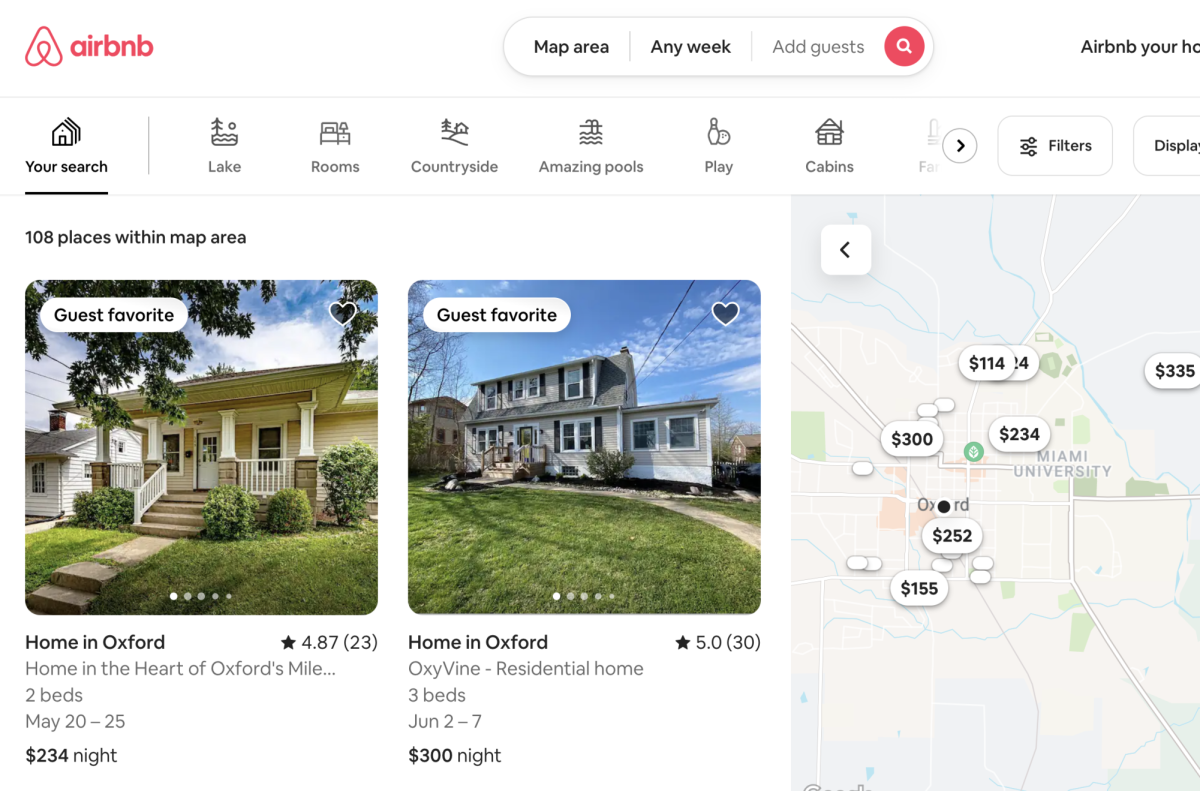Oxford is preparing for one of its busiest weekends: Miami University graduation. As seniors buy red gowns and finish their last exams, their parents book weekend-long stays close to Oxford and as cheap as they can find.
Liz Janowiak is the mother of a soon-to-be graduate who will travel from Maryland to Oxford for her daughter’s graduation.
“It’s ridiculous,” Janowiak said. It’s stupid expensive.”
She booked an Airbnb in Middletown.
“I did find some in Oxford, and I found some in Hamilton. But they were over like $1,500 a night – for three nights, it was gonna be like $6,000 to come for graduation,” Janowiak said.
In March, the city estimated that there were 75 available short-term rentals in Oxford, mostly Airbnb and Vrbo listings. However, due to the council’s implementation of a six-month moratorium on short-term rental permits, the city is not currently permitting new Airbnbs.
The moratorium will end in six months or when the council passes a change in regulation. Sam Perry, Oxford’s Community Development Director, has a draft ready for the council’s meeting next Tuesday, May 14.
The draft targets non-accessory-use short-term rentals: the houses bought with the intention of making them Airbnbs.
“What the moratorium did, that council wanted, was to put a hold on new short-term rentals for this time period while we look at the data,” Perry said.
They want to see how many people are buying homes with the intention of making them Airbnbs.
“If homes are converted to short-term rental only, then that home is now not available for someone to move here and purchase – whether they want to live here, work here, or retire here,” Perry said.
The draft states that to run an Airbnb or Vrbo in Oxford in the future, Airbnb hopefuls may have to sign an affidavit demonstrating the property is their primary residence. It defines a “primary residence” as “the main home of an individual” and says the city can request documentation to prove both ownership and residency.
He said regulation is complicated. His department has the relevant expertise on rental permits and code enforcement. However, they usually deal with what can be seen from the outside of a building, not the inside.
“It’s not something that we’ve been very successful at getting good compliance on and, especially in Oxford, where we have a lot of turnover in ownership,” said Perry.
A local owner of two Airbnbs in Oxford, who asked not to be named, said he bought them both with the primary purpose of turning them into short-term rental properties.
“My opinion is that the city shouldn’t be trying to micromanage the housing markets,” he said. “I think it’s bad policy to tell homeowners how they can use their house.”
He estimated that his properties are booked 20-30% of the year and 75% of weekends. He said he’s hired two women to clean and turn over the properties because owning three homes is a lot of maintenance.
“It’s just, basically, hands off for us,” the Airbnb owner said.
Before the moratorium’s implementation this March, the city’s regulation only limited short-term rentals to “a dwelling unit rented to guests for less than 30 consecutive days at a time.”
Owners needed a rental permit and to pay the city’s “Hotel, Short-term Rental and Convention Tax.” There were no rules on whether the owner had to live in the house.
The short-term rental industry has grown since this legislation was implemented in 2021.
In 2021, Airbnb’s full-year financial results noted a net loss of $352 million. But, in 2022, it had its first profitable year, generating $1.9 billion in net income.
In its 2023 earnings call, executives said the fourth-quarter earnings grew 18% from 2022.
In 2022, it implemented a new “strategic priority to mainstream hosting.” It invested in meeting the demand for new listings by making it easier to start hosting. And, with more listings, it intend for prices to go down.
“We’re seeing overall very stable growth in the US,” said David E. Stephenson, Airbnb’s Chief Business Officer. “We’ve seen very healthy growth in the non-urban markets. Urban markets have been traditionally our areas of strength. Non-urban grew substantially kind of during COVID and coming out of COVID.”
In 2019, the city partnered with the Farmer School of Business to determine the number of Airbnbs in Oxford. According to the Miami University website, it found between June 2017 and 2019, the number of short-term rental listings doubled, reaching 160.
There are over 2,000 Airbnb listings in Louisville, Kentucky. Airbnb said Lousiville was the summer of 2023’s “top trending domestic destination by popularity for US guests this summer.”
It requires a conditional use permit and annual registration to run an Airbnb at a non-primary residence.
Sam Perry said his department is looking at Louisville’s legislation as a reference for better defining a primary residence.
“I don’t think it’s that big of a problem in Oxford, personally,” Perry said. “We’re not a resort community. Ours have been very small numbers, so I think that’s why it’s kind of flown under the radar.”








